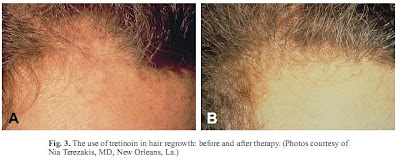Retinoid creams and gels are probably the most effective skin care products out there at the moment. They seem to do just about everything you could hope for: increase skin firmness and hydration, reduce wrinkles, improve skin tone, you name it. But what about hair growth?
The effects of retinoids on hair growth have been much less studied, even though the positive data on skin health suggests they might rejuvenate scalp skin also. My own experiment with retinol (the milder cousin of retinoids) and the resulting new hairs certainly supports this idea.
And yet, while my ongoing experiment with tretinoin has visibly improved my skin, I can't say I've seen much of an increase in hair growth. I find this somewhat surprising, given that tretinoin is much stronger than retinol. Time to take a look at what the science says on retinoids and hair growth.
The earliest paper I could find compared the effects of various treatments on hair regrowth in mice (link). According to the paper, retinoic acid applied topically was the least effective of the three treatments but still caused some hair regrowth after shaving the backs of the mice. Interestingly, UV irradiation was more effective, while estradiol suppressed hair regrowth.
Then, in 1986, a group of scientists decided to try topical retinoids and minoxidil on humans with androgenic alopecia (link). After one year of using the combination, 66% of the participants saw regrowth of terminal hairs. None of the participants used minoxidil alone, but some of them did use only retinoids. Applying 0.025% tretinoin topically resulted in hair growth in 58% of the subjects. The picture below shows one subject before and after using tretinoin.

According to the authors, the hair growth may be due to increased cell proliferation and differentation and the generation of new blood vessels. Another paper that appeared a few years later also speculates on how retinoids might cause hair growth (link). The authors of this paper suggest that certain retinoids increase the rate of hair of hair growth, prolong the anagen phase, and help convert vellus hairs to terminal hairs.
At least in mice, levels of cellular retinoic acid binding protein are higher during the anagen phase and lower during the telogen phase of hair growth. Applying some retinoids topically increases the level of this protein in the skin, which might explain how retinoids prolong the growth phase (link). Both isotretinoin (also called 13-cis-retinoic acid) and tretinoin (also called all-trans-retinoic acid) seem to shorten the telogen phase and increase the anagen phase; however, they also differ in their effects, at least in vitro (link).
A review on retinoids and hair growth states that according to the studies, only tretinoin and isotretinoin are able to prolong the anagen phase (link). I'm not sure how true this statement is, given that other vitamin A derivatives such as etretinate have been associated with hair darkening and new hair growth (link) and even retinol boosts the effectiveness of minoxidil (link).
Not all studies have found the combination of minoxidil and retinoids to be superior to minoxidil alone (link). The hypothesis that retinol and some retinoids increase the absorption of minoxidil is plausible, but this is not the only explanation, since retinoids are effective even on their own. Thus, with or without minoxidil, retinol and retinoids seem worth a shot. Keep in mind, though, that the picture above shows the result after one year of use, and that almost half of the participants did not see an increase in hair growth.
For more information on hair growth, see these posts:
Zinc Pyrithione Reduces Shedding and Moderately Promotes Hair Growth
Hair Growth with Ayurveda – The Nutrich Oil Experiment
Do Flax Lignans Reduce Hair Loss from MPB?
Green Tea Extract Grows Hair in Vitro, Might Work in Vivo





